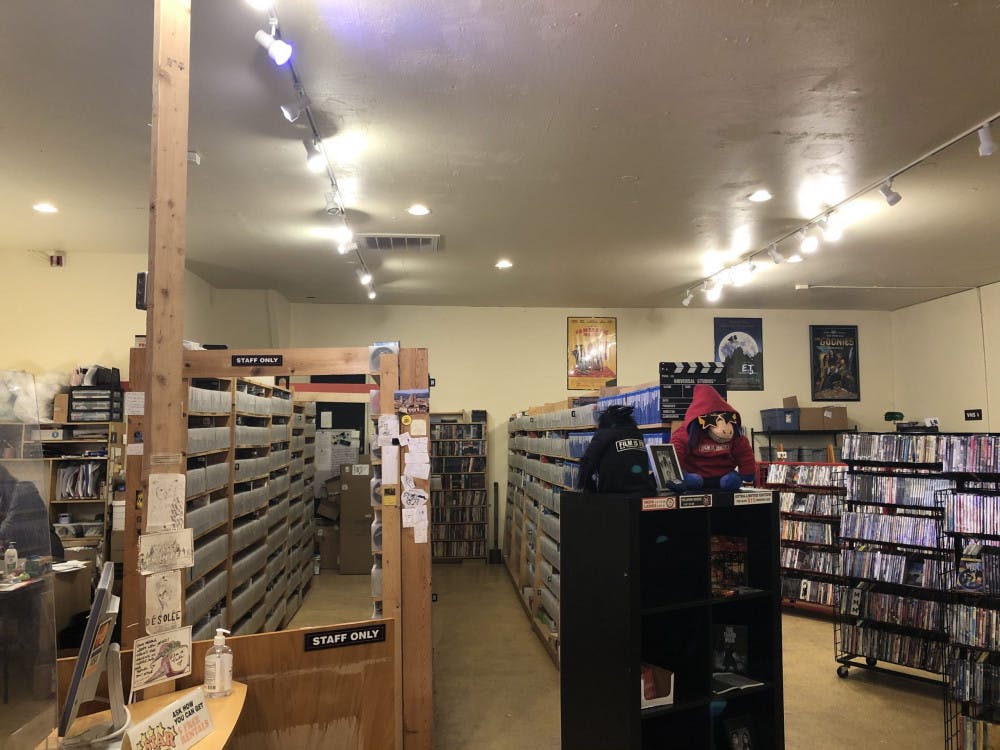Film is still being discovered in brick and mortar stores, where curiosity drives exploration of new titles across shelves — just ask Juliette Burchfield.
Walking around on her day off, Burchfield came across a video store tucked away on Cornwall street called Film is Truth 24 Times a Second. She said that when she discovered the store last week, it was the first time she had been in a video store in over a decade since last visiting her hometown Blockbuster Video.
After checking out a variety of films, Burchfield said that the store satisfied her cinematic interests.
“I feel like it’s better to go into stores like this because they have a wider [selection compared to online],” she said.
Burchfield said that watching French movies is important to her, because her mother is French and films help her learn the language. She also loves anime, like Studio Ghibli movies, something that the store was able to help her find.
When you walk into Film is Truth, it looks like a normal video store. Movie posters decorate the walls, a small snack stand sits in the corner and handwritten notes with movie recommendations are posted in nooks and crannies throughout the space.
But there isn’t much “normal” left to be had. According to the Bureau of Labor Statistics, the annual value of production for video rental stores is down from over $10 billion in 2004 to $1 billion in 2019. Annual employment is down from 157,000 employees to around 5,000 in the same time period.
Benjamin Owens, operations manager for Film is Truth, said that the biggest factor for keeping the store alive despite the statistical trend has been the Bellingham community.
“We're lucky to live in a place that's very locally minded and puts in a lot of energy into making sure local businesses continue to have success,” Owens said. Some customers have been with Film is Truth for several years and through multiple locations.
Film is Truth opened as a business in 1998 but transitioned to a nonprofit in 2013 when their vision shifted towards maintaining a permanent archive of media, he said.
“Our focus statement as a nonprofit is to continue to provide both a space and a film archive of information for people to access as physical media becomes less and less active,” Owens said.
Films are lost in every era of cinematic transformation, Owens said. From the eras of silent to sound, VHS to DVD, and now from physical to digital.
“As streaming [began] to take over, it was very noticeable that a cyclical pattern of the erasure of film was happening again,” Owens said.
The reestablishment of Film is Truth as a nonprofit in 2013 allowed the organization to create new education and entertainment opportunities, including giving free rentals to schools, film clubs and theaters.
Daniel Herbert is an associate professor in the Department of Film, Television and Media at the University of Michigan, and a board member of the nonprofit organization that owns Scarecrow Video in Seattle. He said that while nonprofit video rental stores might be able to show a profit, that’s not their objective.
“The nonprofit status doesn’t fundamentally change the rental status of the operation,” he said, though it allows them to receive donations and apply for grants.
Owens echoed this statement, and said that Film is Truth still pays sales tax for rentals and in-store business, but is tax-exempt for donations and fundraising.
The collections and social aspect of video stores are what keep customers coming back, Herbert said. Herbert said that last surviving video stores sell their collections, but also ideas of a connection, community and cultural importance.
“I do think that there's a lot of customers that still come in here just because they want somebody to talk to about the stuff that they're into,” Owens said.
While streaming services have had many positive impacts on the home video industry, there are thousands of titles you can’t watch online, Owens said. The largest streaming provider, Netflix, has only 6,000 titles. Film is Truth has over 20,000.
The main focus for Netflix, Amazon Prime Video, and other streaming platforms is to create original content, Owens said. He said that this objective is different from retail stores who focus on preserving instead of creating.
Owens said that there are a good portion of customers who are college-aged, but most come from older generations. Some areas in Whatcom County have poor internet connectivity, he said, and many people can’t use movie streaming services, which is where Film is Truth comes in.
Film is Truth survived the decline of brick and mortar stores throughout the 2010s as well as the COVID-19 pandemic. Like other retail stores, Owens said, there was a mandatory shutdown, but Film is Truth was able to continually provide to the community through drive up car service. The store then saw a significant influx of customers as Phase 3 began.
Before the official shutdown of Blockbuster stores in 2013, Herbert spent years on a road trip across the country, interviewing staff at hundreds of video stores to study and understand the social aspect of the business, like asking clerks for recommendations, the curiosity of exploring the collection and establishing relationships with other customers and staff.
It would be his last chance at memorializing these stores before they closed. His findings and analysis became the subject of his book, “Videoland: Movie Culture at the American Video Store.”
Herbert said that in most video stores he visited, the owners did not expect or intend their stores to be community hubs, but were proud because their stores ended up fulfilling that role. While many were resilient to the decline of brick and mortar stores, the pandemic was the final blow.
Last January, Family Video, a Midwest-based video store chain, closed down their remaining 300 stores. They were the last video rental retail chain in the United States, Herbert said.
“So much of our social life is in fact defined by retail,” he said. “We spend a lot of our time out of our houses shopping in places where we have to spend money to be there. And now that we're not doing that, as we used to, we're spending money at home on our screens.”
After Herbert published Videoland in 2014, he was optimistic about the future for video stores, but has since recognized that they are on a downward spiral due to the expansion of high speed internet throughout the country.
In 2010, during his road trip for “Videoland,” Herbert knew he could drive to any small town and stumble upon a video store, even though many had already shut down.
“Now, I don’t even bother asking,” he said.
Clay Wren is a third-year finance major and journalism minor who uncovers the hidden stories of Bellingham. He can be reached any time at claywren.thefront@gmail.com, Instagram: @wrenthejewels






